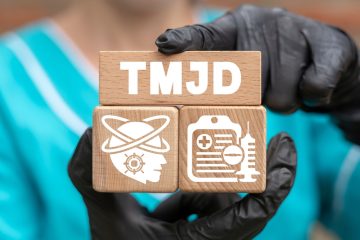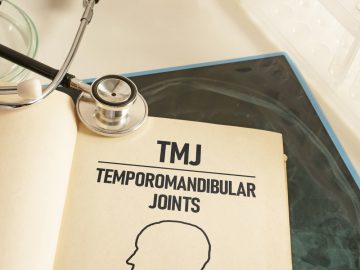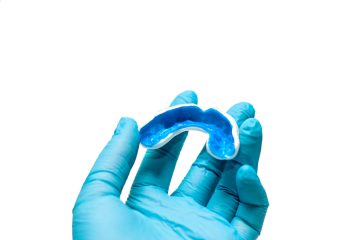Is Jaw Pain Disrupting Your Daily Life?
Temporomandibular joint (TMJ) disorders, often referred to as TMD, or temporomandibular disorder, can significantly impact your quality of life. These conditions affect the jaw joint and surrounding muscles, causing pain and discomfort in the jaw, face, head, and neck. At Gentle Family Dentistry, our Kern County dental practice is skilled at diagnosing and treating TMJ disorders, helping patients in Bakersfield and surrounding areas like Gosford, Alameda, and Lakeview, CA, find relief.
If you’re experiencing severe jaw pain, don’t suffer in silence. Contact Bakersfield, CA, general dentist, Dr. Jonathan Garger and the team at Gentle Family Dentistry today to schedule a comprehensive TMJ evaluation. Call us at 661-664-9900 to take the first step towards a pain-free smile.
Understanding the TMJ
The temporomandibular joints are complex structures that connect your jawbone to your skull. These intricate joints allow for a wide range of motions, including opening and closing your mouth, chewing, and speaking. When problems arise with the TMJ, it can lead to many uncomfortable symptoms and affect your daily activities.
Common Types of TMJ Disorders
At Gentle Family Dentistry, Dr. Garger and his team are experienced in treating various types of TMJ disorders, including:
- Myofascial Pain Disorder: This common type of TMD affects the muscles controlling jaw movement, often caused by stress or overuse.
- Internal Joint Derangement: Characterized by a displaced disc within the joint, leading to clicking sounds and limited jaw movement.
- Degenerative Joint Disease: A condition where the joint’s cartilage wears away over time, causing pain and restricted movement.
- TMJ Ankylosis: A rare but serious condition where the jaw joints become fused, severely limiting jaw mobility.
Temporomandibular joint dysfunction (TMD) is classified into different types, each with distinct symptoms and causes.
Causes and Risk Factors of TMJ Disorders
Understanding the underlying causes of TMJ disorders is crucial for effective treatment. At our Kern County dental practice, we consider various factors that may contribute to TMD, such as:
- Jaw injuries from accidents or sports
- Teeth grinding or clenching (bruxism)
- Arthritis or other joint diseases
- Stress and anxiety
- Poor posture
- Genetic predisposition
- Age and gender (temporomandibular disorder TMD is more common in women aged 35 to 44)
Recognizing TMJ Symptoms
If you’re experiencing any of the following symptoms, it may be time to consult Dr. Garger at Gentle Family Dentistry:
- Jaw pain or tenderness
- Difficulty opening or closing your mouth
- Clicking or popping sounds in the jaw
- Ear pain or aching
- Headaches, neck aches, or shoulder pain
- Difficulty chewing or biting
- Facial swelling
- Neck and facial pain
- Jaw locking, where the jaws cannot move freely
Comprehensive TMJ Diagnosis and Treatment
At Gentle Family Dentistry, we offer a range of diagnostic and treatment options for TMJ disorders:
Diagnosis:
- Thorough clinical examination
- Detailed medical history review
- Advanced imaging techniques when necessary
Treatment Options:
- Custom-fitted night guards to prevent teeth grinding
- Jaw exercises and physical therapy
- Stress management techniques
- Medications for pain relief and muscle relaxation
- Nonsteroidal anti-inflammatory drugs (NSAIDs) like naproxen or ibuprofen for pain relief and reducing muscle swelling
- Minimally invasive procedures for severe cases
Managing TMJ Disorder
Managing TMJ disorder requires a combination of self-care practices, lifestyle changes, and professional treatments. Here are some tips to help you manage TMJ disorder:
- Practice Good Oral Hygiene: Maintaining good oral hygiene is crucial. Brush and floss your teeth regularly to prevent tooth decay and gum disease, which can exacerbate TMJ symptoms.
- Avoid Chewing Gum or Hard Foods: Chewing gum or hard foods can strain your jaw joints unnecessarily, worsening TMJ pain. Opt for softer foods that are easier on your jaw.
- Eat Soft Foods: Incorporate soft foods into your diet to reduce the strain on your jaw joints. Foods like yogurt, mashed potatoes, and smoothies can help alleviate TMJ pain.
- Avoid Teeth Grinding: Teeth grinding, especially at night, can significantly strain your jaw joints. Try to be mindful of this habit and consider using a mouthguard to protect your teeth and jaw.
- Use a Mouthguard: Wearing a custom-fitted mouthguard at night can help prevent teeth grinding and alleviate TMJ pain. Our dental team can create a personalized mouthguard tailored to your needs.
- Practice Relaxation Techniques: Stress can exacerbate TMJ symptoms. Incorporate relaxation techniques such as meditation, deep breathing exercises, or yoga into your daily routine to help manage stress and reduce jaw tension.
Finding the Right Treatment
Finding the right treatment for TMJ disorder can be challenging, but with the right approach, you can find relief. Here are some steps to help you find the right treatment:
- Consult a Dentist or Doctor: The first step is to consult a healthcare professional who can diagnose the cause of your TMJ symptoms. They can recommend the best course of treatment based on your specific condition.
- Try Conservative Treatments: Start with conservative treatments such as physical therapy, pain relief medication, and relaxation techniques. These methods can be effective in alleviating TMJ symptoms without invasive procedures.
- Consider Alternative Treatments: Alternative treatments like acupuncture, massage therapy, and chiropractic care can also provide relief from TMJ symptoms. These therapies can complement traditional treatments and offer additional benefits.
- Seek a Second Opinion: If you’re not satisfied with your current treatment plan, don’t hesitate to seek a second opinion from a specialist. Different perspectives can help you find the most effective treatment for your condition.
What to Expect with TMJ Disorder Treatment
TMJ disorder treatment can vary depending on the cause and severity of your symptoms. Here’s what you can expect:
- Conservative Treatments: Conservative treatments such as physical therapy, pain relief medication, and relaxation techniques can take several weeks to several months to show significant improvement. Patience and consistency are key.
- Alternative Treatments: Alternative treatments like acupuncture, massage therapy, and chiropractic care may require multiple sessions to be effective. These treatments can provide gradual relief and improve overall well-being.
- Surgery: In severe cases of TMJ disorder, surgery may be necessary. Surgical procedures can take several weeks to several months for full recovery. Your healthcare provider will guide you through the process and help you understand the expected outcomes.
- Follow-up Appointments: Regular follow-up appointments with your dentist or doctor are essential to monitor your progress and adjust your treatment plan as needed. These appointments ensure that your treatment is effective and any issues are addressed promptly.
Jaw Joint Health and TMJ Disorders
Maintaining jaw joint health is essential for preventing TMJ disorders. Here are some tips to promote jaw joint health:
- Practice Good Oral Hygiene: Brush and floss your teeth regularly to prevent tooth decay and gum disease, which can contribute to TMJ disorders.
- Avoid Chewing Gum or Hard Foods: Chewing gum or hard foods can strain your jaw joints and exacerbate TMJ symptoms. Opt for softer foods that are easier on your jaw.
- Eat Soft Foods: Incorporate soft foods into your diet to reduce the strain on your jaw joints. Foods like yogurt, mashed potatoes, and smoothies can help alleviate TMJ pain.
- Avoid Teeth Grinding: Teeth grinding can put significant strain on your jaw joints. Be mindful of this habit and consider using a mouthguard at night to protect your teeth and jaw.
- Use a Mouthguard: Wearing a custom-fitted mouthguard at night can help prevent teeth grinding and alleviate TMJ pain. Our dental team can create a personalized mouthguard tailored to your needs.
- Practice Relaxation Techniques: Stress can exacerbate TMJ symptoms. Incorporate relaxation techniques such as meditation, deep breathing exercises, or yoga into your daily routine to help manage stress and reduce jaw tension.
By following these tips and seeking professional care when needed, you can maintain healthy jaw joints and reduce the risk of developing TMJ disorders.
Preventing TMJ Disorders
At Gentle Family Dentistry in Bakersfield, CA, Dr. Jonathan Garger and his team are committed to helping patients prevent TMJ disorders through proactive care. We recommend the following comprehensive preventive measures to maintain optimal jaw health:
Avoid Excessive Jaw Strain:
- Limit gum chewing to short periods
- Refrain from nail biting and other oral habits
- Cut hard foods into smaller pieces to reduce jaw stress
- Avoid clenching your jaw during the day
Practice Good Posture:
- Maintain proper alignment of your head, neck, and spine
- Use ergonomic furniture and supports at work and at home
- Take regular breaks to stretch and realign your posture
- Consider gentle neck and shoulder exercises to reduce tension
Use Custom Night Guards:
- If you grind your teeth at night, a custom-fitted night guard can protect your teeth and jaw
- Our dental team can create a personalized night guard tailored to your mouth
- Wear the guard consistently for maximum benefit
Stress Management Techniques:
- Practice deep breathing exercises or meditation
- Engage in regular physical activity to reduce overall stress
- Consider cognitive behavioral therapy for stress reduction
- Try progressive muscle relaxation, focusing on jaw muscles
Maintain Regular Dental Check-ups:
- Schedule bi-annual visits to Gentle Family Dentistry
- Allow Dr. Garger to monitor your jaw health and bite alignment
- Address any dental issues promptly to prevent TMJ complications
- Discuss any jaw discomfort or changes in bite during your visits
Frequently Asked Questions
Yes, TMJ disorder is a relatively common condition that affects millions of people worldwide. Temporomandibular disorders (TMDs) are a group of over 30 conditions affecting the temporomandibular joints (TMJs) and associated jaw muscles. It’s more common in women than men and often affects people between the ages of 20 and 40.
The exact prevalence of TMD is difficult to determine because many people don’t seek medical attention for their symptoms or are misdiagnosed with other conditions. However, research suggests that up to 12 percent of the population may experience some form of TMD at some point in their lives.
Yes, children can develop TMJ disorders, although it’s less common than in adults. Some common causes of TMD in children include jaw injuries, misaligned teeth or jaws, and habits such as nail biting, gum chewing, or thumb sucking.
Yes, certain dietary factors can contribute to TMJ disorder:
- Eating hard or crunchy foods, such as nuts or popcorn, can put excessive strain on the joints and jaw muscles, exacerbating TMD symptoms.
- Chewing gum or eating chewy foods, such as candy or gumdrops, can also contribute to jaw pain and discomfort.
- Consuming foods high in sugar or caffeine can contribute to muscle tension and pain, which can worsen TMJ symptoms.
Experience Relief from TMJ Pain with Gentle Family Dentistry
Don’t let jaw pain control your life any longer. Choose Gentle Family Dentistry for expert TMJ treatment in Bakersfield and surrounding areas. Dr. Jonathan Garger and his team offer years of expertise, state-of-the-art technology, and personalized care in a comfortable, welcoming environment. Our Kern County dental practice is committed to helping you achieve a pain-free, healthy smile.
Take the first step towards relief today. If you’re in Bakersfield, Gosford, Alameda, or Lakeview, CA, and experiencing TMJ symptoms, contact Gentle Family Dentistry by dialing 661-664-9900 to schedule your consultation with Dr. Garger. Let us help you reclaim your comfort and quality of life.